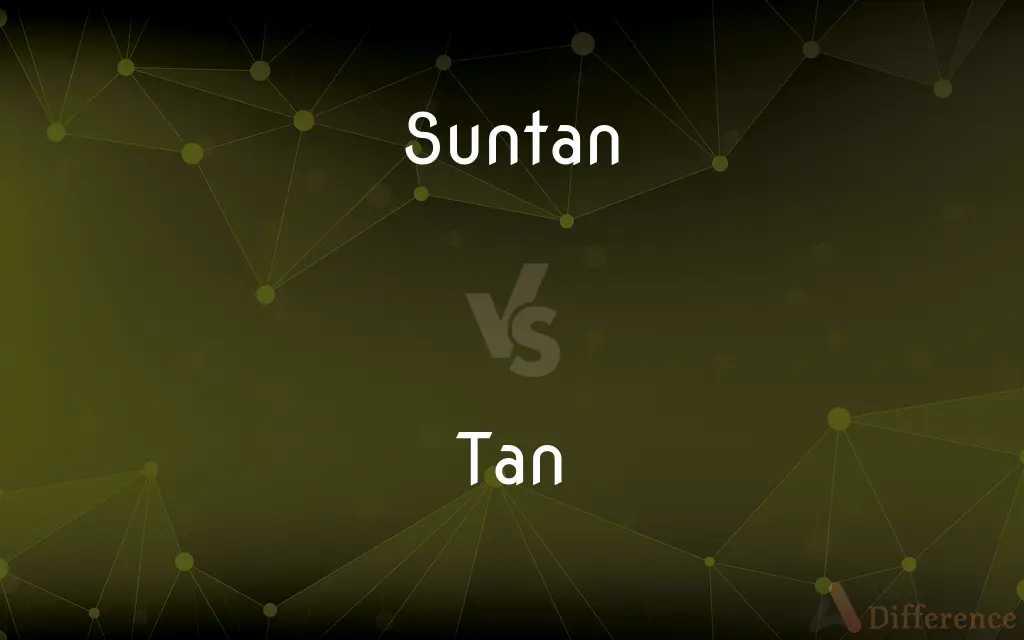Suntan vs. Tan — What's the Difference?
By Fiza Rafique & Maham Liaqat — Updated on May 6, 2024
A suntan is specifically acquired from sun exposure, emphasizing natural UV light interaction, while a tan can be achieved through artificial methods like tanning beds.

Difference Between Suntan and Tan
Table of Contents
ADVERTISEMENT
Key Differences
A suntan results from exposure to the sun's ultraviolet (UV) rays, which stimulate the production of melanin in the skin. On the other hand, a tan can also be obtained artificially through the use of tanning beds or tanning lotions.
The process of getting a suntan is typically a gradual one, often requiring several sessions of sun exposure. Whereas, tanning methods such as tanning beds can provide a tan more quickly and with less time spent under UV rays.
Suntans are generally considered to have a variable effect on the skin depending on the individual's skin type and the intensity of the sun. In contrast, artificial tanning can be controlled for intensity and duration, offering a more consistent result.
While suntans are free and achieved during outdoor activities, artificial tanning methods often incur a cost and require visiting specialized facilities or purchasing specific products.
Suntanning carries risks such as sunburn and long-term skin damage if done without adequate sun protection. Conversely, while artificial tanning methods like tanning beds are designed to minimize sunburn, they still pose risks of skin damage and increased risk of skin cancer.
ADVERTISEMENT
Comparison Chart
Source
Sun's UV rays
Sun's UV rays or artificial sources (e.g., tanning beds)
Cost
Free (sun exposure)
May involve costs (tanning products or services)
Control over process
Less control, depends on natural conditions
More control, settings can be adjusted
Time to achieve
Gradual, depends on exposure
Can be immediate or customized
Health risks
Sunburn, long-term skin damage
Potential for similar risks plus concerns specific to artificial sources
Compare with Definitions
Suntan
Often associated with outdoor activities.
The beachgoers sported suntans from summer days spent by the sea.
Tan
A darkening of the skin achieved through sun exposure or artificial means.
He maintained his tan through visits to a tanning salon.
Suntan
Considered healthy-looking by some cultures.
They admired his healthy suntan, associating it with an active lifestyle.
Tan
Can be achieved quickly using tanning beds or lotions.
She used a tanning lotion to get a quick tan for the wedding.
Suntan
A natural process involving the increase of melanin to protect the skin.
His suntan was a result of hiking outdoors every weekend.
Tan
Popular in many cultures for aesthetic reasons.
Many people desire a tan to look more toned.
Suntan
A darkening of the skin resulting from exposure to the sun.
She developed a deep suntan after her vacation in Hawaii.
Tan
May involve products or services that incur costs.
Her monthly budget included a line for tanning salon expenses.
Suntan
Can vary widely depending on individual skin type and sun intensity.
Her light suntan was barely noticeable, despite hours in the sun.
Tan
Requires careful management to avoid health risks.
He used a high SPF sunscreen to protect his tan and his skin health.
Suntan
A darkened coloring of the skin resulting from exposure to the sun.
Tan
To convert (an animal hide) into leather by subjecting it to a chemical process that stabilizes the proteins, making it less susceptible to decay.
Suntan
In humans a brown or darkened coloration of the skin caused by exposure to ultraviolet light.
Tan
To make (a person or a person's skin) darker by exposure to the sun.
Suntan
To obtain a suntan by exposure to ultraviolet light.
Tan
To make (a person or a person's skin) darker by exposure to artificial sunlight or by the application of certain chemicals, often in the form of sprays or lotions.
Suntan
To attempt to obtain a suntan.
Tan
(Informal) To thrash; beat.
Suntan
A browning of the skin resulting from exposure to the rays of the sun
Tan
To become darker from exposure to the sun or artificial sunlight, or from the application of certain chemicals.
Suntan
Get a tan from being exposed to the sun
Tan
A light or moderate yellowish brown to brownish orange.
Tan
A suntan.
Tan
An artificially created suntan.
Tan
Tanbark.
Tan
Tannin.
Tan
A solution derived from tannin.
Tan
See Tanka.
Tan
Light or moderate yellowish-brown to brownish-orange.
Tan
Having a suntan or the appearance of a suntan.
Tan
Used in or relating to tanning.
Tan
A yellowish-brown colour.
Tan
A darkening of the skin resulting from exposure to sunlight or similar light sources.
She still has a tan from her vacation in Mexico.
I'm hoping to get a tan this weekend at the beach.
Tan
The bark of an oak or other tree from which tannic acid is obtained.
Tan
An Armenian drink made of yoghurt and water similar to airan and doogh
Tan
Syn of picul, particularly in Cantonese contexts.
Tan
(dialectal) A twig or small switch.
Tan
Yellowish-brown.
Mine is the white car parked next to the tan pickup truck.
Tan
Having dark skin as a result of exposure to the sun or an artificial process intended to mimic this effect.
You’re looking very tan this week.
Tan
To change to a tan colour due to exposure to the sun.
No matter how long I stay out in the sun, I never tan, though I do burn.
Tan
To change an animal hide into leather by soaking it in tannic acid. To work as a tanner.
Tan
To spank or beat.
Tan
To kill by gun, to shoot.
Tan
The second cardinal number two, formerly used in Celtic areas, especially Cumbria and parts of Yorkshire, for counting sheep, and stitches in knitting.
Tan
See Picul.
Tan
The bark of the oak, and some other trees, bruised and broken by a mill, for tanning hides; - so called both before and after it has been used. Called also tan bark.
Tan
A yellowish-brown color, like that of tan.
Tan
A brown color imparted to the skin by exposure to the sun; as, hands covered with tan.
Tan
Of the color of tan; yellowish-brown.
Tan
To convert (the skin of an animal) into leather, as by usual process of steeping it in an infusion of oak or some other bark, whereby it is impregnated with tannin, or tannic acid (which exists in several species of bark), and is thus rendered firm, durable, and in some degree impervious to water.
Tan
To make brown; to imbrown, as by exposure to the rays of the sun; as, to tan the skin.
Tan
To thrash or beat; to flog; to switch; as, to tan a disobedient child's hide.
Tan
To get or become tanned.
Tan
A browning of the skin resulting from exposure to the rays of the sun
Tan
A light brown
Tan
Ratio of the opposite to the adjacent side of a right-angled triangle
Tan
Treat skins and hides with tannic acid so as to convert them into leather
Tan
Get a tan, from wind or sun
Tan
Of a light yellowish-brown color
Common Curiosities
What is a suntan?
A suntan is the skin's natural response to UV exposure from the sun, resulting in a darker skin tone.
Is a suntan safer than an artificial tan?
Both have risks; suntans involve direct UV exposure, while artificial tans can involve UV or chemical exposure.
Can a tan be achieved without the sun?
Yes, tans can be obtained through artificial sources like tanning beds or creams.
How can I maintain my tan?
Maintaining hydration, using moisturizers, and regular but safe exposure to tanning sources can help.
What are the risks of using a tanning bed?
Risks include skin damage, premature aging, and increased risk of skin cancer.
How is a tan different from a suntan?
A tan can be achieved both naturally and artificially, unlike a suntan which is solely due to sun exposure.
Can a suntan protect from sunburn?
A suntan provides a small amount of UV protection, but not enough to prevent sunburn.
How long does it take to get a suntan compared to a tan?
A suntan usually takes longer as it is dependent on natural sun exposure, while artificial tans can be much quicker.
How do I safely get a suntan?
Limiting exposure time, using sunscreen, and avoiding the sun's peak hours help reduce risks.
Is a suntan permanent?
No, a suntan fades as skin cells renew.
What is the quickest way to get a tan?
Using a tanning bed or applying a bronzing lotion can provide an immediate tan.
Can people with all skin types get a suntan?
Yes, though the level and speed of tanning vary widely.
Are there any benefits to having a tan?
Some perceive aesthetic benefits, but there are no significant health benefits to tanning.
Can tanning lotions cause harm?
Some contain chemicals that may irritate the skin or cause allergic reactions.
Do tanning beds offer a safer alternative to sunlight?
No, they also emit UV radiation and pose similar risks to sun exposure.
Share Your Discovery

Previous Comparison
Aunt vs. Uncle
Next Comparison
Keratin vs. ScaleAuthor Spotlight
Written by
Fiza RafiqueFiza Rafique is a skilled content writer at AskDifference.com, where she meticulously refines and enhances written pieces. Drawing from her vast editorial expertise, Fiza ensures clarity, accuracy, and precision in every article. Passionate about language, she continually seeks to elevate the quality of content for readers worldwide.
Co-written by
Maham Liaqat















































